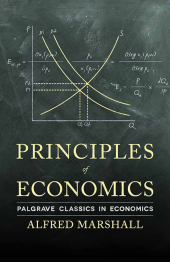 Neuerscheinungen 2013Stand: 2020-01-07 |
Schnellsuche
ISBN/Stichwort/Autor
|
Herderstraße 10
10625 Berlin
Tel.: 030 315 714 16
Fax 030 315 714 14
info@buchspektrum.de |

Alfred Marshall
Principles of Economics
Alfred Marshall
2013. 768 S. 216 mm
Verlag/Jahr: SPRINGER PALGRAVE MACMILLAN 2013
ISBN: 0-230-24929-9 (0230249299)
Neue ISBN: 978-0-230-24929-5 (9780230249295)
Preis und Lieferzeit: Bitte klicken
Alfred Marshall, Principles of Economics (1890) Founder of Modern (Neo-classical) Economics. His book Principles of Economics was the dominant textbook in economics for a long time and it is considered to be his seminal work.
Alfred Marshall, Principles of Economics (1890) - Founder of Modern (Neo-classical) Economics. His book Principles of Economics was the dominant textbook in economics for a long time and it is considered to be his seminal work.
BOOK I: PRELIMINARY SURVEY 1. Introduction 2. The Substance of Economics 3. Economic Generalizations or Laws 4. The Order and Aims of Economic Studies BOOK II: SOME FUNDAMENTAL NOTIONS 1. Introductory 2. Wealth 3. Production, Consumption, Labour, Necessaries 4. Income. Capital. BOOK III: ON WANTS AND THEIR SATISFACTION 1. Introductory 2. Wants in Relation to Activities 3. Gradations of consumers´ demand 4. The elasticity of wants 5. Choice between different uses of the same thing. Immediate and deferred uses. 6. Value and utility BOOK IV: THE AGENTS OF PRODUCTION. LAND, LABOUR, CAPITAL AND ORGANIZATION T 1. Introductory 2. The Fertility of Land 3. The Fertility of Land, continued. The Tendency to Diminishing Return. 4. The Growth of Population 5. The Health and Strength of the Population 6. Industrial Training. 7. The Growth of Wealth 8. Industrial Organization 9. Industrial Organization, continued. Division of Labour. The Influence of Machinery 10. Industrial Organization, continued. The Concentration of the Specialized Industries in Particular Localities. 11. Industrial Organization, continued. Production on a Large Scale 12. Industrial Organization, continued. Business Management. 13. Conclusion. Correlation of the Tendencies to Increasing and to Diminishing Return BOOK V: GENERAL RELATIONS OF DEMAND, SUPPLY, AND VALUE 1. Introductory. On Markets. 2. Temporary Equilibrium of Demand and Supply 3. Equilibrium of Normal Demand and Supply 4. The Investment and Distribution of Resources 5. Equilibrium of Normal Demand and Supply, continued, with reference to long and short periods 6. Joint and Composite Demand. Joint and Composite Supply 7. Prime and total cost in relation to joint products. Cost of marketing. Insurance against risk. Cost of Reproduction. 8. Marginal costs in relation to values. General Principles. 9. Marginal costs in relation to values. General Principles, continued 10. Marginal costs in relation to agricultural values 11. Marginal costs in relation to urban values 12. Equilibrium of normal demand and supply, continued, with reference to the law of increasing return 13. Theory of changes of normal demand and supply, in relation to the doctrine of maximum satisfaction 14. The theory of monopolies 15. Summary of the general theory of equilibrium of demand and supply BOOK VI: THE DISTRIBUTION OF THE NATIONAL INCOME 1. Preliminary survey of distribution 2. Preliminary survey of distribution, continued 3. Earnings of labour 4. Earnings of labour, continued 5. Earnings of labour, continued 6. Interest of capital 7. Profits of capital and business power 8. Profits of capital and business power, continued 9. Rent of land 10. Land tenure 11. General view of distribution 12. General influences of progress on value 13. Progress in relation to standards of life


